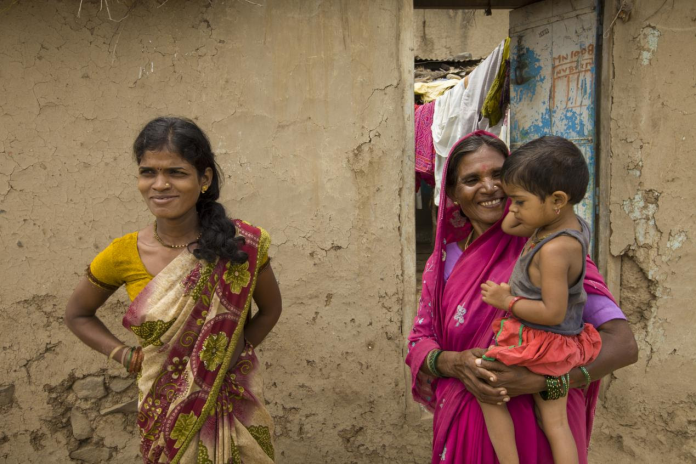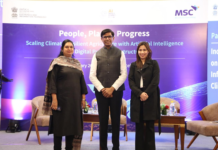Donal Brown, associate vice-president for the department of country operations at the UN’s International Fund for Agriculture Development (IFAD), concluded a four-day visit to India to meet with authorities, visit successful IFAD-supported projects and reinforce the commitment of the UN’s international financial institution to promote inclusive and sustainable agricultural growth in the country.
“IFAD is dedicated to helping develop India’s rural communities by supporting small-scale farmers to sustainably increase their production,” said Brown. “IFAD’s partnership with India, a global leader in rural innovation, is a powerful example of how collaboration can empower rural communities and create sustainable pathways out of poverty,” he added.
During his visit, Brown met with Devesh Chaturvedi, secretary, ministry of agriculture, government of India, and Manisha Sinha, additional secretary, department of economic affairs, as well as senior officials in the Maharashtra government.
Over the past 30 years, India has made considerable progress in reducing with a multidimensional approach that takes into account deprivations in health, education and living standards. Yet, 11 per cent of the population remains multidimensionally poor. Given that over 40% of India’s workforce is still engaged in farming and related activities, investing in rural areas is critical to reduce poverty and improve livelihoods.
Led by Brown, the IFAD delegation include Pieternel Boogard, managing director for Office of Technical Delivery, and Abdelkarim Sma, India Country director a.i. and lead regional rconomist for Asia and the Pacific at IFAD, saw first-hand the impact of such investment. In the western state of Maharashtra, the delegation visited participants of Nav Tejaswini, an IFAD-supported project working with rural women and their families. This initiative aims to provide access to finance to at least 1 million rural women. The project encourages participants to start or grow their businesses and provides access to specific training.
The delegation met with female community managers in Nagpur and visited a processing unit for lentils to learn how they work with farmers. They also visited a Centre for Excellence, which is a collaboration between the nodal agency for women empowerment programs MAVIM (Maharashtra Arthik Vikas Mahamandal), IFAD and the Gates Foundation as part of a Gender Transformative Mechanism (GTM) grant to expand the scope of work of Nav Tejaswini to gender equality and women empowerment.
The delegation met Sujata Saunik, chief secretary, Maharashtra, and Vanadana Krishna, secretary, Women and Child Development, Maharashtra, to discuss the impact and progress of the partnership.
“Meeting with the women of Nav Tejaswini was special. I admire their drive to find jobs, start businesses and build better lives for themselves and their families. Their success is obvious. They prove how investing in people can transform their lives. This is what empowerment is all about,” said Boogard.
India is a founding member of IFAD and the partnership spans over 45 years. India is not only among the largest recipients of IFAD’s investments, but also a significant contributor in terms of both financial support and corporate and policy engagement as a member of IFAD’s Executive Board.
IFAD’s strategy for India is aligned with the government’s policy framework, aiming to ensure that smallholder food and agricultural production systems are remunerative and sustainable.
IFAD has supported 34 rural projects worth US$1,521.58 million directly impacting over 6.3 million households in India. Major achievements of IFAD in India include helping organize grassroots institutions to enable rural communities to manage their own development, supporting the commercialization of smallholder agriculture, women empowerment and improving livelihoods in tribal areas.
IndiFoodBev — authentic, impactful and influential
An English-language food and beverage processing and packaging industry B2B platform in print and web, IndiFoodBev is in its third year of publication. It is said that the Indian food and beverage industries represent approximately US$ 900 billion in revenues which implies more than 20% of the country’s GDP. Eliminating the wastage on the farmside can help to deliver more protein to a higher number of the population apart from generating sizable exports. The savings in soil, seeds, water, fertilizer, energy and ultimately food and nutrition could be the most immense contribution that country is poised to make to the moderation of climate change.
To improve your marketing and grow sales to the food and beverage processing and packaging industry, talk to us. Our research and consulting company IppStar [www.ippstar.org] can assess your potential and addressable markets in light of the competition. We can discuss marketing, communication, and sales strategies for market entry and growth.
Suppliers and service providers with a strategy and budget for targeted marketing can discuss using our hybrid print, web, video, and social media channels to create brand recognition linked to market relevance. Our technical writers are ready to meet you and your customers for content.
The second largest producer of fruit and vegetables in the world is continuously expanding processing capacities and delivery systems with appropriate innovative technologies. We cover product and consumer trends, nutrition, processing, research, equipment and packaging from farm to thali. Get our 2025 media kit and recalibrate your role in this dynamic market. Enhance your visibility and relevance to existing markets and turn potential customers into conversations. Ask for a sample copy of our bi-monthly in print or our weekly IndiFoodBev eZine each Wednesday.
For editorial info@ippgroup.in — for advertisement ads1@ippgroup.in and for subscriptions subscription@ippgroup.in
Naresh Khanna – 10 February 2025
Subscribe Now











